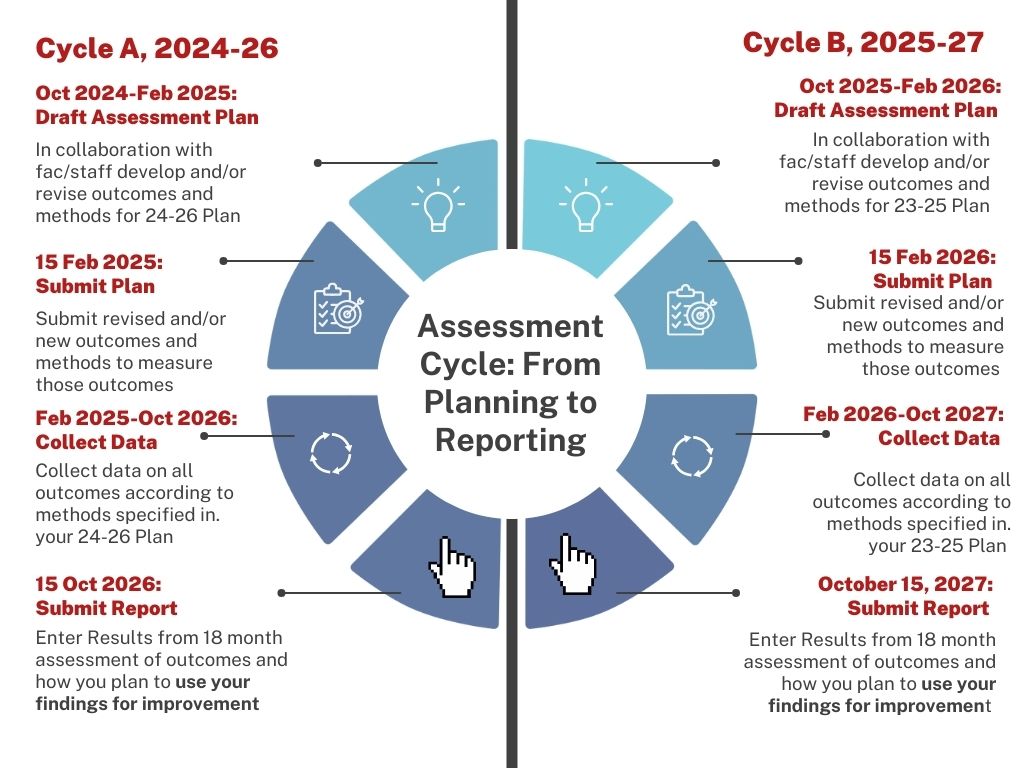Institutional Effectiveness
Institutional Effectiveness facilitates the systemic improvement of the quality of academic programs, co-curricular programs student, and academic success services, research, service, and administrative services.
Improving student learning, institutional programs, and university services.
Aims of Assessment at UM
As part of our commitment to continual improvement and accreditation responsibilities, all degree programs; non-degree granting units, departments, offices, centers and institutes; and general education competency areas participate in an ongoing, biennial assessment process.
Institutional Effectiveness (IE) at the University of Mississippi is facilitated by the efforts of assessment coordinators, faculty and staff who lead their program or unit assessment activities; the University Assessment Committee (UAC), faculty, staff, and students who provide peer feedback and assistance to units; assessment liaisons, the faculty and staff representatives in each school/college and division who coordinate and communicate institutional effectiveness processes; and the IE team within IREP.
Assessment Cycle: From Planning to Seeking Improvement
Our process involves setting measurable outcomes, identifying appropriate methods to measure those outcomes, collecting and analyzing the data gathered from those measures, interpreting the results, and planning for improvement. The biennial assessment process is grounded in research and scholarly practice and is designed to be sustainable.
Accessing Nuventive
Use this link to access Nuventive https://olemiss.edu/nuventive
Please note, you will be prompted to login using your UM email ID and current password.
Please direct all assessment-related questions to improvement@olemiss.edu
Our Assessment Process
The University of Mississippi degree granting programs, non-degree granting units, and general education competency areas report on a biennial cycle.
Programs and units are divided equally across two cycles, Cycle A and Cycle B. Units and programs in Cycle A submit their assessment reports in October of even years based on plans submitted in February of the previous odd year. For example, Cycle A units submitted assessment reports in October 2024 based on plans submitted in February 2023. Similarly, units and programs in Cycle B submit their assessment reports in October of odd years based on plans submitted in February of the previous even year. Cycle B submitted assessment reports in October 2025 based on the plans submitted in February 2024. The figure below depicts the biennial cycle.

There are some exceptions to the biennial assessment cycle in which units submit assessment reports annually. New programs or units may submit annual reports until they are able to align with the established biennial cycle. Existing programs or units may be asked to report annually if the University Assessment Committee (UAC) review of their report indicates additional attention is needed to the assessment efforts. Exceptions to the biennial cycle are handled on an individual basis.
Assessment plans are developed by faculty and/or staff and include outcomes and measures each unit establishes for themselves. Assessment plans are submitted biennially on February 15th and are reviewed by University Assessment Committee (UAC) members to ensure robust assessment methods and best practices are utilized.
Outcome statements are:
- Mapped to the program/department, university mission/goals, and discipline/program accreditation guidelines (where applicable)
- Grounded in field and discipline norms
- Written clearly with specificity using measurable verbs
- Aimed at specific areas of improvement
- Able to measure student learning, program quality, and/or student achievement
- Developed in collaboration with faculty and staff
- Additional information about outcomes statements is available in Box.
Degree granting programs must include:
- Two or more student learning outcomes
- What graduates/students know or are able to do as much as a result of the program
- May be same as learning outcomes required by program or discipline accreditors
- Undergraduate degree programs should consider linking to one or more general education competency area and learning outcome where applicable
- Graduate degree programs should consider linking to one or more graduate education outcomes. Visit the Graduate School Catalog.
- Two or more educational program outcomes
- Quality of the program such as student satisfaction, retention, enrollment
- May be same as program outcomes required by program or discipline accreditors
- One or more student achievement outcomes
- Accomplishments of students such as job placement rates, graduate school acceptance, publications, presentations
- May be same as student achievement outcomes required by program or discipline accreditors
Non-degree granting unit must include:
- Three or more outcomes
- May include student learning/development outcomes if co-curricular programs are offered
- Focus on services that are provided
- Focus on what stakeholders can do as a result of the service
- Units should consider linking to university goals. See Empower Now for more information.
- May include outcomes required by program or discipline accreditors.
Assessment methods and strategies:
- Assessment methods should be specific enough to yield results that can lead to identifying areas for improvement
- Each outcome should include at least two assessment methods, generally one direct and one indirect measure
- Consider course-embedded assessment strategies that can be used for program assessment
- Include a criterion of excellence for each measure to determine when expectations are met or improvements are needed.
- Additional information about assessment methods is available in Box.
Assessment reports are developed by faculty and/or staff and complete the cycle that began with outcomes and measures. Assessment reports add results and uses of results, including plans to seek improvement, to the outcomes and measures already established in the assessment plan. Assessment reports are submitted biennially on October 15th and are reviewed by University Assessment Committee (UAC) members to ensure best practices are utilized and opportunities to seek improvement are identified.
Assessment results should:
- Align with criterion stated in the outcomes and measures
- Summarize qualitative and/or quantitative data collected
- Describe how faculty and staff were involved in interpreting the results
Uses of results should:
- Include interpretation of and reflection on results
- Indicate evidence of implementation fidelity
- Include planned modifications to student learning, department goals, and/or unit services
- Describe plans for seeking improvement in the next assessment cycle
- Demonstrate how findings were communicated to stakeholders
- Additional information about assessment reports is available in Box
Assessment of student learning and development and/or programs and services affords academic and administrative leaders the opportunity to seek improvement. Reviewing and interpreting assessment results and subsequently developing changes designed to yield improvement is a critical step in the assessment process. Assessment for improvement requires time, attention, and participation by faculty and staff.
Assessment is also used to meet calls for accountability from program accreditors, institutional accreditors, and institutional stakeholders.
Here are some helpful resources for seeking improvement in the assessment process:
Assessment, Accountability, and Improvement: Revisiting the Tension by Peter T. Ewell
Using Evidence to Make a Difference by Stan Ikenberry and George Kuh
The General Education Committee is a University standing committee that holds the broad responsibility of leading the university in fulfilling its general education mission for all undergraduate degrees at the university. The committee makes recommendations to the Provost and the Dean of the College of Liberal Arts and appropriate academic units regarding the philosophy of general education, as well as policy, learning outcomes, curriculum, assessment, and continual improvement of general education. The committee will lead the campus in exploring, debating, and defining the values and proper role of general education in fostering well-rounded educational experiences consistent with the function of a public research university.
General Education Competencies
Upon completing the core curriculum, along with certain courses within the program/major and co-curricular learning experiences, University of Mississippi baccalaureate-seeking students should demonstrate the following General Education competencies:
- critical thinking,
- ethical reasoning and ethical responsibility,
- mathematical reasoning,
- oral communication, and
- written communication.
General Education Subcommittees
The general education subcommittees serve as stewards of the competency and accompanying outcomes, providing at least annual updates to the General Education Committee about student learning, modifications to the outcomes, modifications made to improve student learning, and proposals to improve student learning across campus. General Education subcommittees represent each of the general education competencies – critical thinking, ethical reasoning and ethical responsibility, mathematical reasoning, oral communication, and written communication. Each subcommittee will include at least a faculty member from the discipline(s), faculty member from related discipline(s), faculty member from outside the field, and an IREP representative.
The University of Mississippi General Education Committee recommends the general education competencies which are approved by the Undergraduate Council and Council of Academic Administrators.

The General Education Committee co-chairs appoint the subcommittee members. UM assesses these general education competencies using a combination of direct and indirect assessment methods and involves assessment of learning associated with both lower division/core curriculum courses and within each educational program/major. The latter types of assessment reflect the institution’s philosophy that General Education core competencies should be introduced in lower division/core courses, reinforced in program-specific courses, and reiterated through co-curricular experiences.

Leading the Assessment Process
Have questions or concerns? I'm here to help!
McKenna Rose
Associate Director, Institutional Effectiveness
